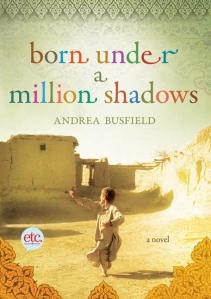
My
name is Fawad, and my mother tells me I was born under the shadow of
the Taliban. Because she said no more, I imagined her stepping out of
the sunshine and into the dark, crouching in a corner to protect the
stomach that was hiding me, while a man with a stick watched over us,
ready to beat me into the world.
In 21st century
Afghanistan, war has shaped much of life for several generations. After
the Afghans were finally liberated from Russian occupation in 1989, the
power vacuum was filled by rival warlords, and the country was consumed
by civil war. Then the rise of the Taliban finally brought peace, but at
a terrible price.
Fawad, the perceptive, funny eleven-year-old narrator of
Born Under a Million Shadows,
sees the Taliban fall in 2001. Fawad and his mother have lost most of
their family and rely on the charity of relatives. His father and
brother were killed, and his sister was abducted by Taliban forces and
never seen again. Along with his friends and cousins, Fawad tries to
earn or beg for money, on the streets of Kabul, to help them survive.
Then
Fawad's mother, Mariya, finds a housekeeping position with a group of
foreigners. They go to live with her employers, including Georgie, a
British aid worker, and May, an engineer from America, who are helping
with the gradual process of rebuilding Afghanistan. Their household also
includes James, a British journalist. The lifestyles and values of
their housemates are very different from the strict Muslim way Fawad and
his mother have always lived. James is in inveterate drinker and
fancies himself a bit of a ladies' man. May is a lesbian, and Georgie is
involved with the powerful Afghan warlord Haji Khan, a dangerous man
who may be involved in the opiate trade. Despite their differences,
bonds of affection quickly grow, and Fawad, Mariya, and their
English-speaking housemates form a colorful, unusual sort of family.
British journalist
Andrea Busfield has lived and worked in Afghanistan, and her passion for this beautiful, war-torn country illuminates
Born Under a Million Shadows.
She vividly paints the streets of Kabul and the mountainous
countryside, and reading this novel, I absorbed some of her love and
understanding of the Afghan culture.
While this book deals with
grim subjects, it is not a sad book. It doesn't shy away from the
suffering woven throughout the story, but it doesn't sink into despair,
either. Death and violence are part of daily life in Kabul, so people
just carry on, striving to survive, looking out for friends and
relatives, offering hospitality to guests, celebrating holidays, and
falling in love. What really stands out in this book -- aside from the
strong sense of time and place -- is the vibrant cast of characters, the
connections among them, and the humor that flows throughout the story.
I
think this book will appeal to a wide range of fiction lovers,
particularly those who enjoy delving into other places and cultures.
FTC Disclosure: I received a copy of this book from the publisher with no expectation other than that I read it and offer an honest review.
Read Another Review:
Misfit Salon
Rating: 4
| 5- Cherished Favorite | 4 - Keep in My Library | 3 - Good Read | 2 - Meh | 1 - Definitely Not
For Me |




